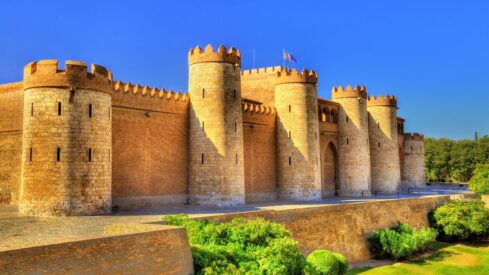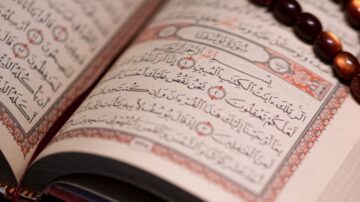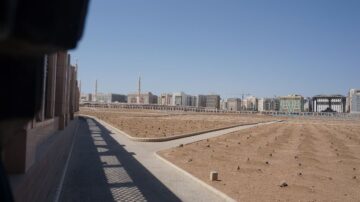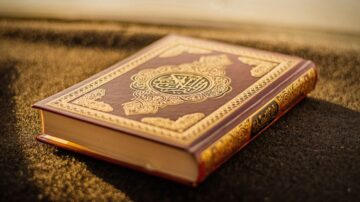The impression that Islam left on Christianity as a heretical religion was countered by the admiration of Islamic civilization in the works of some late medireview and Renaissance thinkers. The Islamic scientific and philosophical culture, inter alia, played a significant role in this process, and we can mention here only two examples both of which show the extent to which Muslim philosophers were embraced with full enthusiasm.
Our first example is Dante and his great work The Divine Comedy, an epitome of medireview Christian cosmology and eschatology in which everything is accorded a place proper to its rank in the Christian hierarchy of things. Writing in his purely Christian environment, Dante places the Prophet of Islam and Ali in hell in Canto XXVIII where he describes the heretics in the ninth level of hell. By contrast, he places Saladin, Avicenna, and Averroes in the limbo, thus granting them the possibility of salvation. This positive attitude is further revealed by the fact that Siger de Brabant, the champion of Latin Averroism, is placed in paradise as a salute to the memories of Avicenna and Averroes. With this scheme, Dante points to a way of coming to terms with the problem of Islam: if Islam is to be rejected as a faith, its intellectual heroes are to be accorded their proper place.
Another closely associated case in which one can easily discern a different perception of Islamic culture is the rise of Latin Averroism (the philosophy of monopsychism) in the West and its dominance of the intellectual scene of the Scholastics until its official ban in 1277 by Bishop Tempier. Even though Averroism was denounced as a heretical school, it remained to be a witness to the deep impact of Islamic thought on the West. Roger Bacon (1214-1294), one of the luminaries of 13th century Scholasticism, called for the study of the language of Saracens so that they can be defeated on intellectual, if not religious, grounds. Albertus Magnus (c. 1208-1280), considered to be the founder of Latin scholasticism, was not shy in admitting the superiority of Islamic thought on a number of issues in philosophy. Even Raymond Lull (c. 1235-1316), one of the most important figures for the study of Islam in the Middle Ages in spite, or perhaps because, of his zeal to convert Muslims and refute Averroism once and for all, was in favor of the scholarly study of Islamic culture in tandem with his conviction that the Christian faith could be demonstrated to non-believers through rational means. Finally, St. Thomas Aquinas (1225-1274) who represents the pinnacle of Christian thought in the classical period could not remain indifferent to the challenge of Islamic thought and especially that of Averroes since Averroism was no longer a distant threat but something right at home as represented by such Latin scholars as Siger de Brabant (c. 1240-1284), Boethius of Dacia and other Averroists.
It is pertinent to point out that this new intellectual attitude towards Islam comes to fruition at a time when Western Europe, convinced of the promising threat of Muslim power, was hoping for the conversion of the Mongols (“Tartars” as they were called by Latins) into Christianity to solve the problem of Islam. With Mongols embracing Islam under the leadership of Oljaytu, the grandson of Chengiz Khan, however, these hopes fell on the ground and the deployment of philosophical rather than purely theological methods of persuasion presented itself as the only reasonable way of dealing with the people of Islamic faith. Interestingly enough, the interest of European scholars in Islamic culture minus its religion in the 11th and 12th centuries contributed to what C. H. Haskins has called the “Renaissance of the twelfth century”.
The belligerent attitude towards Islam as a heresy remained to be an invariable even after the demise of the Christian Middle Ages when Western Europe sat out to forge a new paradigm which would culminate in the rise of a secular modern worldview. Pascal (1623-1662), perhaps the most passionate defender of the Christian faith in the 17th century, for instance, was as harsh and uncompromising as his predecessors in condemning the Prophet of Islam as an impostor and fraudulent prophet. The ‘fifteenth movement’ of his Les Pensées, called contre Mahomet, voices an important sentiment of Pascal and his co-religionists on Islam and the Prophet Muhammad: Muhammad is in no way comparable to Jesus; Muhammad speaks with no Divine authority; he brought no miracles; his coming has not been foretold; and what he did could be done by anyone whereas what Jesus did is supra-human and supra-historical.
A similar attitude penetrates the work of George Sandys (1578-1644) entitled Relation of a Journey begun An. Dom. 1610. Foure Books. Containing a description of the Turkish Empire, of Aegypt, of the Holy Land, of the Remote parts of Italy, and Ilands adioyning, which is one of the earliest travel accounts of the Islamic world to reach Europe. A humanist as much as a Christian, Sandys saw Islam under the same light as Pascal did and had no intentions of placing his ‘humanist’ outlook over his Christian prejudices against Islam. Sandys’ book contains important observations on the Islamic world, highly polemical remarks about the Qur’an and the Prophet, and finally some very edifying praises of Muslim philosophers. The dual attitude of rejecting Islam as a religion while admiring its cultural achievements is clearly exemplified in Sandys’ work. Of “the Mahometan Religion”, Sandys has the following to say:
So that we may now conclude, that the Mahometan religion, being derived from a person in life so wicked, so worldly in his projects, in his prosecutions of them so disloyal, treacherous & cruel; being grounded upon fables and false revelations, repugnant to sound reason, & that wisdom which the Divine hand hath imprinted in his works; alluring men with those enchantments of fleshly pleasures, permitted in this life and promised for the life ensuing; being also supported with tyranny and the sword (for it is death to speak there against it;) and lastly, where it is planted rooting out all virtue, all wisdom and science, and in sum all liberty and civility; and laying the earth so waste, dispeopled and uninhabited, that neither it came from God (save as a scourge by permission) neither can bring them to God that follow it.
By contrast, Sandys follows suit in pitting Muslim philosophers against Islam as a common strategy during the late Middle Ages and the Renaissance, the implicit assumption, voiced by a figure no less prominent than Roger Bacon, being the secret conversion of Avicenna and Averroes into Christianity or simply their professing the Muslim faith for fear of persecution. Needless to say, this was the only possible way of explaining the genius of Muslim philosophers and scientists against the backdrop of a religion that the medireview West abhorred, rejected, and ignored. Thus Sandys speaks of Avicenna (Ibn Sina) in terms of an unmistakable vindication while discarding Islam as irrational on the basis of the celebrated ‘double-truth theory’ attributed by St. Thomas Aquinas to Averroes:
For although as a Mahometan, in his books De Anima and De Almahad, addressed particularly to a Mahometan Prince, he extolleth Mahomet highly, as being the seal of divine laws and the last of the Prophets… But now this Auicen, laying down for a while his outward person of a Mahometan, and putting on the habit of a Philosopher; in his Metaphysics seemeth to make a flat opposition between the truth of their faith receiued from their Prophet, and the truth of understanding by demonstrative argument… And it is worthy observation, that in the judgment of Avicien one thing is true in their faith, & contrary in pure & demonstrative reason. Whereas (to the honor of Christian Religion be it spoken) it is confessed by all, & enacted by a Council, that it is an error to say, one thing is true in Theology, & in Philosophy the contrary. For the truths of religion are many times above reason, but never against it.
We see a similar line of thought articulated in Peter Bayle’s monumental Dictionnaire historique et critique (Historical and Critical Dictionary, 1697). Bayle (1647-1706) was one of the pioneers of the Enlightenment and his skeptical scholarship had a deep impact on the French Encyclopedists, championed by Diderot, and the rationalist philosophers of the 18th century. His Dictionnaire, which has been aptly called the “arsenal of the Enlightenment”, devotes a generous and unusually lengthy twenty-three page entry on the Prophet of Islam under the name “Mahomet” as opposed to seven pages given to Averroes and only half a page to al-Kindi (“Alchindus”).
Even though Bayle exercises caution in narrating the Christian bashings of Islam and the Prophet and rejects some of the legendary stories concerning the Prophet’s tomb being in the air, his dead body having been eaten by dogs as a sign of Divine curse and punishment, and his being the anti-Christ as simply foolish and baseless, he joins his fellow Europeans in describing the Prophet of Islam as a man of sensuality and the sword, as an impostor, and as a “false teacher”. In The Dictionary, the Prophet appears under the same light of medireview Christian polemics, and Bayle states, on Humphrey Prideaux’s authority, that
Mahomet was an impostor, and that he made his imposture subservient to his lust … what is related of his amours, is very strange. He was jealous to the highest degree, and yet he bore with patience the gallantries of that wife [‘A’ishah], which was the dearest to him
and that
… I choose to concur with the common opinion, That Mahomet was an impostor: for, besides what I shall say elsewhere his insinuating behavior, and dexterous address, in procuring friends, do plainly show, that he made use of religion only as an expedient to aggrandize himself.
Even though Bayle’s entry is hardly an improvement upon the gruesome picturing of the Prophet in the previous centuries, it contains some important observations on Islamic culture based mostly on the available travel accounts of the time. The modesty of Turkish women, for instance, is narrated in the context of stressing the ‘normalcy’ of Muslim culture, which is contrasted to the common mores of Europe, indicating in a clear way the extent to which Europe’s self-image was at work in various depictions of Islam and Muslims. Bayle also praises Muslim nations for their religious tolerance and admonishes the zeal of medireview Christians to persecute their own co-religionists. Bayle, like many of his predecessors and peers, pits Muslim history against the injunctions of the religion of Islam and explains the glory of Muslim history as a result of the deviation of Muslim nations from the principles of Islam rather than an application of them. Thus he says that :
the Mahometans, according to the principles of their faith, are obliged to employ violence, to destroy other religions, and yet they tolerate them now, and have done so for many ages. The Christians have no order, but to preach, and instruct; and yet, time out of mind, they destroy, with fire and sword, those who are not of their religion. ‘When you meet with Infidels,’ says Mahomet, ‘kill them, cut off their heads, or take them prisoners, and put them in chains, till they have paid their ransom, or you find it convenient to set them at liberty. Be not afraid to persecute them, till they have laid down their arms, and submitted to you’. Nevertheless, it is true, that the Saracens quickly left off the ways of violence; and that the Greek churches, as well the orthodox as the schismatical, have continued to this day under the yoke of Mahomet. They have their Patriarchs, their Metropolitans, their Synods, their Discipline, their Monks … It may be affirmed for a certain truth, That if the western princess had been lords of Asia, instead of the Saracens and Turks, there would be now no remnant of the Greek church, and they would not have tolerated Mahometanism, as these Infidels have tolerated Christianity.
Interestingly enough, however, Bayle, towards the end of his entry, refers his curious readers to the work of Humphrey Prideaux (d. 1724) of Westminster and Christ Church for further information about Islam. Entitled in a typical manner as The true nature of imposture fully display’d in the life of Mahomet: With a discourse annex’d for the vindication of Christianity from this charge. Offered to the considerations of the Desists of the present age, Prideaux’s book, published in 1697, was one of the most virulent and bitter attacks on Islam during the Enlightenment period and the title it bears requires little explanation as to its content. That Prideaux’s work became a best-seller in the 18th century and was printed many times until the 19th century is quite telling insofar as the Enlightenment’s philosophers’ approach to Islam is concerned.
The Enlightenment’s robust rationalism and overt disdain for religion was certainly a major factor in the reinforcement of the medireview perceptions of Islam as a religious worldview, and attacking Islam was an expedient way of deconstructing religion as such. This attitude is much obvious in Voltaire (1694-1778), one of the most widely read celebrities of the Enlightenment, who took a less hostile position towards Islamic culture while maintaining the erstwhile Christian representations of the Prophet Muhammad. In his famous tragedy Fanatisme ou Mahomet le prophete, Voltaire projects Muhammad as a prototype of fanaticism, cruelty, imposture, and sensuality, which was nothing new to his readers except for the fact that he had invented his own legends and stories that he seems to have thought served his purposes better. In a letter to Frederick of Prussia, he states that:
a merchant of camels should excite a revolt in his town … that he should boast of being rapt to Heaven, and of having received there part of this unintelligible book which affronts common sense at every page; that he should put his own country to fire and the sword, to make this book respected; that he should cut the fathers’ throats and ravish the daughters; that he should give the vanquished the choice between his religion and death; this certainly is what no man can excuse.
History has its own checks and balances. The ambivalent attitude of the 17th and 18th centuries, torn between the received images of Islam and the Prophet from Christian polemics and the glory of Islamic civilization witnessed by many travelers and scholars, resulted in a different genre of writing concerning Islam, and one very interesting work to be mentioned here is Stubbe’s ‘defense of Islam’. A typical Renaissance man, historian, librarian, theologian and a doctor, Henry Stubbe (1632-1676), published an unusual book, which was to cause Prideaux to write his attack mentioned above, with the following title: An account of the rise and progree of Mahometanism with the life of Mahomet and a vindication of him and his religion from the calumnies of the Christians. Stubbe had no reservations in going against the grain and responding to the traditional charges of violence and sensuality associated with Muslims. More importantly, he openly defended Islamic faith as more proximate to man’s reason and nature as a tacit way of criticizing Christian theology and sacraments. A typical passage from his book states that
This is the sum of Mahometan Religion, on the one hand not clogging Men’s Faith with the necessity of believing a number of abstruse Notions which they cannot comprehend, and which are often contrary to the dictates of Reason and common Sense; nor on the other hand loading them with the performance of many troublesome, expensive, and superstitious Ceremonies, yet enjoying a due observance of Religious Worship, as the surest Method to keep Men in the bounds of their Duty both to God and Man.
In addition to the Islamic faith, the Prophet Muhammad himself receives a very fair treatment from Stubbe who appears to be heralding the rise of a new class of European scholars of Islam in the 18th and 19th centuries.
In contradistinction to the radical opposition of Pascal, Bayle, Brideaux, and Voltaire to Muhammad as a figure of religion, some of their contemporaries including Stubbe saw something different in the Prophet of Islam as a man of the world. Divested of his claims to have received God’s word, the Prophet Muhammad could be appreciated for what he had accomplished in history. This is an important shift from the strictly Christian assessments of Muhammad as a false prophet to putting increasingly more emphasis on his human qualities.
This new attitude is also the beginning of the depiction of the Prophet and many other figures of the past as ‘heroes’ and ‘geniuses’, the ostensibly non-religious terms that the Enlightenment intellectuals were fond of using against the Christian conceptions of history. The 17th and 18th centuries witnessed the rise of many scholars and intellectuals who looked at the Prophet of Islam under this new light and this, in turn, led to more liberal and less inimical appraisals of Islam and Muslims. In England, Edward Pococke (1604-1691), the first chair holder of Islamic studies at Oxford, published his Specimen Historiae Arabum, a medley of analyses and translations on the history of Islam, its basic tenets and practices, and a selective rendering of one of the works of al-Ghazali. Judged by the standards of his time, Pococke’s work was a major step in the scholarly study of Islam. Furthermore, Pococke was one of the first among the European scholars of Islam to spend time in the Islamic world collecting material for his studies.
Of equal importance and prominence was George Sale (1697-1736) who produced the first English translation of the Qur’an in 1734, making use of Lodovico Marracci’s Latin translation, published at Padua in 1698, rather than that of Robert Ketton published in the 12th century. Sale had no intentions of granting Islam any authenticity as a religion, and he made this point very clear in his ‘Preliminary Discourse’ written as a preface to his translation. His overall approach to Islam that gained him the half-belittling title ‘half-Mussulman’, however, was to set the tone for the 18th and 19th century studies of Islam in Europe, paving the way for the establishment of Orientalism as a discipline.
Sale’s translation was a huge improvement on an earlier rendering of the Qur’an into English by Alexander Ross from the French translation of Andre du Ryer published in 1647 almost a century before Sale’s laborious work reached the English reader. For better or worse, Sale’s translation was the definitive text of the Qur’an in the English language well until the end of the 19th century and it was this very translation that Gibbon and Carlyle read closely and discarded hopelessly as “a wearisome confused jumble, crude, incondite; endless iterations, long-windedness, entanglement; most crude, incondite; – insupportable stupidity, in short! Nothing but a sense of duty could carry any European through the Qur’an.”
While the Qur’an and, by derivation, the religious foundations of Islam were invariably denied, the human qualities of the Prophet of Islam were repeatedly invoked by the humanist intellectuals of the 18th and 19th centuries either to level subtle criticisms against Christianity or simply to cherish the humanist-secular philosophy of history. The depiction of the Prophet as a genius and as a hero with a piercing mind and perspicacity, remarkable power of persuasion, sincerity, and dedication reached a climax with Carlyle and his heroic philosophy of history.
In Carlyle’s work, the Prophet is presented as a remarkable man of the world: a hero, a genius, a charisma, a personality that the Christian spirit of the Middle Ages was incapable of seeing and appreciating. Although Carlyle had placed his analysis of the Prophet within a clearly secular framework and thus preempted any charges of heresy, he still felt obligated to apologize for his positive estimation of the Prophet:
as there is no danger of our becoming, any of us, Mahometans, I mean to say all the good of him I justly can. It is the way to get at his secret: let us try to understand what he meant with the world; what the world meant and means with him, will then be a more answerable question.
A much more asserting voice of the time was that of Goethe (1749-1832) who was neither secretive nor apologetic about his admiration of things Islamic. His West-oestlicher Diwan was a loud celebration of Persian-Islamic culture and his interest in the Islamic world went certainly beyond the mere curiosity of a German poet when he said, as quoted by Carlyle, that “if this be Islam, do we not all live in Islam?” In 19th century, Goethe’s call was taken up by a whole generation of European and American poets and men of literature, which included such celebrities as Emerson and Thoreau.
by Ibrahim Kalin











